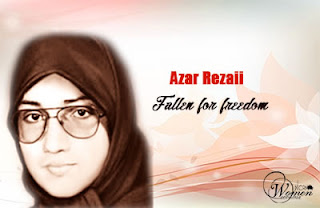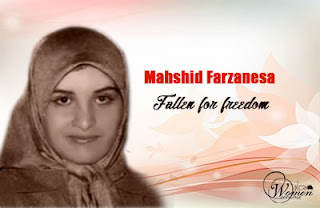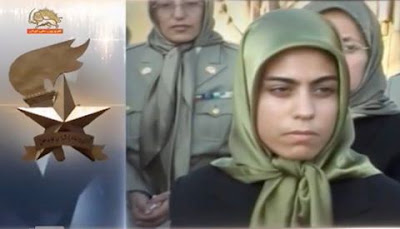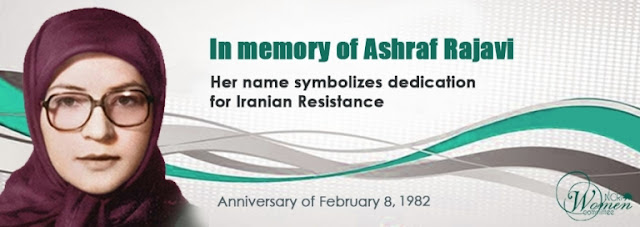The West's indifference to Iran's historic crimes lets my brother's killers get away with murder.
By Massoumeh Raouf
On a cold day in March 1988, my colleague came to me and said 'Masoumeh, Masoumeh, you have a letter'.
International business Times, August 30, 2017 - Receiving a letter is a routine for most people, but not for me. I was a former political prisoner in Iran and had been sentenced to 20 years' imprisonment in the city of Rasht in northern Iran. I was able to escape the prison miraculously and cross Iran's borders in a completely non-standard fashion. In the midst of a severe crackdown on dissent in Iran, it was very risky to send me a letter.
Read more

Fatemeh (Razieh) Ayatollahzadeh Shirazi
Symbol of Valor
In 1981, she got arrested while pregnant. She delivered her baby in prison, but due to the horrible prison conditions and malnutrition, her baby died after birth. She also lost her husband and comrade, Mehdi Hashemzadeh Sabet, when he was executed by the regime.
Brave Mansoureh Moslehi chose to defend her cause for the liberation of Iran’s women
Mansoreh was 18 when she arrested by Iran revelotionly gurds
and immediately taken for interrogation. Mansoureh was never intimidated by her torturers. Although she was whipped by cables, she endured the pain and never betrayed her compatriots.
after 5 years in Prison Her freedom was another opportunity for her to reunite with the PMOI. She knew that in order to join the resistance she had to leave the country and go to Camp Ashraf in Iraq.
Unfortunately, she was arrested at the border and directly sent to Evin Prison.
This time, Mansoureh resisted the tortures and solitary confinement even more courageously. Her inmates don’t recall a moment of despair, frustration, or fatigue in her face. Her high spirits and determination were always inspiring to other inmates.
Sadly, Mansoureh and thousands of other Mojaheds were hanged during the 1988 massacre. Khomeini’s fatwa did not spare anyone who maintained adherence to the struggle for liberation of Iran.
Mansoureh chose to defend her cause for the liberation of Iran’s women and the liberation of her compatriots. She thus joined the galaxy of over 120,000 shining stars who gave their lives to bring freedom, justice and liberation to everyone.
We shall begin with your names
By: Mohammad Gharaei (M. Showghi)
A poem dedicated to the 30,000 heroes and heroines executed during the 1988 massacre of political prisoners in Iran. Under the rule of Velayat-e faqih (Guardianship of the Islamic Jurist) and according to Khomeini's fatwa many of the prisoners arrested merely for defending justice and freedom based on the PMOI/MEK identity were executed after some kangaroo courts which usually were wrapped up after only a few minutes. They accepted death but did not surrender to the ideology of hate marked by Khomeini.
To those massacred in the summer of 1988
Oh! Heroes! and heroines!
We shall begin everything with your names.
Our songs; And the songs of our children
Marches of the people's army
On the anniversary of victory.
And we will make you as everlasting symbols
Word by word
In our books
In the fountains
Of our cities
And no sign of your name, the Braves, were neglected,
The names of the wardens
The color of noose
And the shape of the footstool
From every corner
We will gather,
And register
In every corner of his powerful memory
We will register.
We will change our hearts, eyes and the arms to memory
To be able to remember your names
And the color of every moment of those nights
That died in the corridors of death
Every twist and shake of your body
When was hanging from those dirty ropes
We remember your names
Like the festive clothes of the patriotic heroes
In the myths of battlefields
We remember…..
What’s my crime? We don’t want anything but freedom… We are not better than others either. We want to choose how to live. We don’t want anyone telling us what to do. I choose prison and let the future decide what price we paid for freedom.”This are the word of Laya Onsoriyan.18 years old young beautiful woman.
35 years ago in this days 12 hero wear executed in Tabriz prison North West of Iran.
Most of them were the supporters of MEK/PMOI.
Among them was brave Laya. She was so brave and stood up against guards in prison and Torture that prison officials hated her very much; that is why before her execution, they raped her first, then drained her blood and finally killed her by firing five bullets to her abdomen.
Her last word to the executor was:
We are Mojahede Khalg MEK/PMOI We are not afraid of death But you the Reactionaries and guards must be afraid
This is the story of Zohreh Heydari a 17-year-old Iranian woman from the city of Qom (125 kilometers by road southwest of Tehran). She was part of the first group of people who were taken away during the massacre in the summer of 1988, executing more than 30,000 people in Iran. The article By Hassan Mahmoudi on American Thinker, July 21, 2017 -He talk about the memories of Zohreh whole he was in prison
Read more
The shining stars and heroines of the Iranian Resistance
 February 8th marks the anniversary of a fate-making event in the history of the Iranian people's quest for freedom.On February 8, 1982, Khomeini's Revolutionary Guards surrounded and destroyed the headquarters and killed some of the most prominent leading figures of the PMOI. Khomeini –still alive in those days-- thought that by dealing such a heavy blow to the opposition, he could put up a show of force, demoralize the staunch supporters of the movement and break their resistance in prisons and outside.
February 8th marks the anniversary of a fate-making event in the history of the Iranian people's quest for freedom.On February 8, 1982, Khomeini's Revolutionary Guards surrounded and destroyed the headquarters and killed some of the most prominent leading figures of the PMOI. Khomeini –still alive in those days-- thought that by dealing such a heavy blow to the opposition, he could put up a show of force, demoralize the staunch supporters of the movement and break their resistance in prisons and outside.
It was an unequal battle between thousands of heavily armed guards vs. 20 freedom fighters. He thought victory is certain. However, the champions of freedom did not surrender and fought to the last breath, creating an epical scene that strengthened the movement even further.
The women involved in this battle left a brilliant legacy in the history of the Iranian people's struggle for freedom and democracy. Brave women who did not surrender and resisted and fought courageously to the last breath to herald a new world for their fellow compatriots. Today, their resolve and courage has been multiplied in the ranks of the pioneering women in the PMOI who lead the Resistance movement.
Her name symbolizes dedication for Iranian Resistance
February 8th marks the anniversary of a fate-making event in the history of the Iranian people's quest for freedom.
On February 8, 1982, Khomeini's Revolutionary Guards surrounded and destroyed the headquarters the most prominent leading figures of the PMOI. Khomeini –still alive in those days-- thought that by dealing such a heavy blow to the opposition, he could put up a show of force, demoralize the staunch supporters of the movement and break their resistance in prisons and outside.
It was an unequal battle between thousands of heavily armed guards vs. 20 freedom fighters. He thought victory is certain. However, the champions of freedom did not surrender and fought to the last breath, creating an epical scene that strengthened the movement even further.
The women involved in this battle left a brilliant legacy in the history of the Iranian people's struggle for freedom and democracy. Today, their resolve and courage has been multiplied in the ranks of the pioneering women in the PMOI who lead the Resistance movement.
Read more
 Born in 1960 in Tehran, Azar was one of the daughters of the famous and popular Rezaii family who had lost four of their children in the struggle against the Shah's regime. So, she had been involved in the struggle since very young age and even imprisoned at age 14.After the fall of the Shah, she joined the PMOI and worked with the students' department.Azar was married to Moussa Khiabani, deputy to the PMOI leader. She was slain with her unborn fetus at the time of the attack on February 8.
Born in 1960 in Tehran, Azar was one of the daughters of the famous and popular Rezaii family who had lost four of their children in the struggle against the Shah's regime. So, she had been involved in the struggle since very young age and even imprisoned at age 14.After the fall of the Shah, she joined the PMOI and worked with the students' department.Azar was married to Moussa Khiabani, deputy to the PMOI leader. She was slain with her unborn fetus at the time of the attack on February 8. Born in 1958 in Tehran, she got to learn about the Shah's oppression in very young age. In 1978, she entered Tehran University to study Laboratory Sciences. As a student, she actively participated in all the anti-government demonstrations of those days.After the Shah was toppled, Mahshid joined the PMOI. She was always very energetic and loved what she did for her people's freedom.On February 8, 1982, she and her husband and their infant daughter were in the house when the attack began. Mahshid and her husband fought and died courageously in this unequal battle.
Born in 1958 in Tehran, she got to learn about the Shah's oppression in very young age. In 1978, she entered Tehran University to study Laboratory Sciences. As a student, she actively participated in all the anti-government demonstrations of those days.After the Shah was toppled, Mahshid joined the PMOI. She was always very energetic and loved what she did for her people's freedom.On February 8, 1982, she and her husband and their infant daughter were in the house when the attack began. Mahshid and her husband fought and died courageously in this unequal battle. Mahnaz Kalantari Mahnaz Kalantari is another one of the shining stars who gave her life for her people and country on February 8, 1982.She was a university student when she joined the PMOI after the 1979 Revolution.Mahnaz was serious and hard-working and a well-known advocate of freedom in her university who enjoyed much respect among her friends.
Mahnaz Kalantari Mahnaz Kalantari is another one of the shining stars who gave her life for her people and country on February 8, 1982.She was a university student when she joined the PMOI after the 1979 Revolution.Mahnaz was serious and hard-working and a well-known advocate of freedom in her university who enjoyed much respect among her friends. Sorayya was born in 1959 in Isfahan and finished her high school there.Then she joined supporters of the PMOI in that city. After a while she moved to Tehran where she worked with the Mothers' Society supporting the PMOI.(Mothers were referred to free thinking middle-age women whose sons and daughters were involved with the PMOI or were slain as PMOI members but themselves were also willing to do support the cause by whatever means they were capable of. Because of age difference, however, they were referred to as mothers.)Sorayya had a one-year-old daughter whom she put in a safe place, before being killed along with her husband in the clashes on February 8, 1982.
Sorayya was born in 1959 in Isfahan and finished her high school there.Then she joined supporters of the PMOI in that city. After a while she moved to Tehran where she worked with the Mothers' Society supporting the PMOI.(Mothers were referred to free thinking middle-age women whose sons and daughters were involved with the PMOI or were slain as PMOI members but themselves were also willing to do support the cause by whatever means they were capable of. Because of age difference, however, they were referred to as mothers.)Sorayya had a one-year-old daughter whom she put in a safe place, before being killed along with her husband in the clashes on February 8, 1982.
I was tremendously moved when I read an example of unparalleled resistance and martyrdom of political prisoner Maliheh Aghvami. The splendor of character and the spiritual and physical prowess of a young woman particularly when she was approaching her execution was incredible to me.
According to Maliheh's sister, a member of the Bassij Force went to their family after Maliheh's execution and gave them a box of sweets and 500 toumans as her alimony. What could this disgraceful act mean?
Maliheh was not the only young woman whose family had received an alimony from the clerical regime. In most cases, the criminal mullahs did not return the victim's body to her family after being executed. Neither have they disclosed the place of her burial. So, why was it so important for the mullahs to make sure the alimony is delivered to the family?
Political pirisoner,Maryam Akbari Monfared has filed official complaint from the prison and asked Tehran prosecutor's office to investigate the death of his brother and sister who were executed in the summer of 1988 while serving their prison sentences.
Children of female prisoners detained in dungeons
An Iranian woman, Soulmaz Ikdar, posted a shocking story on her Google+ account on November 25, 2016, in which she narrated a shocking story on the situation of prisoners and prisoners in 1988.
The names of some of the PMOI women who were executed while pregnant by the Iranian regime
Story of The life of Parvaneh Alvandpour
 Faeze Rajabi, the daughter of Abdolreza Rajabi:"When I got older, my father would tell us in every visit, 'Go to Ashraf - that is where you belong.' He would say that Ashraf is the hope of the Iranian people. At that time, I didn't understand what kind of a place Ashraf is. All I wanted was to be near him and hug him and kiss him in the visits we had once in a while, and tell him how much I missed him.
Faeze Rajabi, the daughter of Abdolreza Rajabi:"When I got older, my father would tell us in every visit, 'Go to Ashraf - that is where you belong.' He would say that Ashraf is the hope of the Iranian people. At that time, I didn't understand what kind of a place Ashraf is. All I wanted was to be near him and hug him and kiss him in the visits we had once in a while, and tell him how much I missed him.
When I came to Ashraf for a visit and then decided to stay here, I finally understood what he had said all along about Ashraf"
Damona Ta'avoni: The only prisoner who didn't have a blindfold was me!
ACTIVISTS OF THE PMOI PAY TRIBUTE TO POLITICAL PRISONERS WHO WERE MASS EXECUTED IN IRAN'S MASHHAD
Mahnaz Sa'eidi: The hot summer days remind me of the summer when I last visited my mum.
Those days, I was a little girl all of whose emotions and dreams were tied to the loving gaze of her mother.
See more click here
The Fallen for Freedom
Monireh Rajavi
Monireh Rajavi, the younger sister of the Iranian Resistance’s Leader, Massoud Rajavi, was executed on Khomeini’s order along with the 30,000 victims of the regime’s political massacre in summer 1988.
Monireh was arrested along with her husband and her daughters only because she was Massoud Rajavi’s sister. Khomeini’s henchmen held special spite towards Monireh Rajavi, humiliating and insulting her because she was Massoud Rajavi’s sister. Monireh was imprisoned and tortured six years in Evin Prison under horrendous conditions in the presence of her two young daughters and after the execution of her husband.
While in captivity, she was under tremendous pressure to denounce his brother on television, but refused to do so, prompting the authorities to execute her in 1988 as an act of vengeance against Massoud Rajavi.
Reed more
Monireh Rajavi, the younger sister of the Iranian Resistance’s Leader, Massoud Rajavi, was executed on Khomeini’s order along with the 30,000 victims of the regime’s political massacre in summer 1988.
Monireh was arrested along with her husband and her daughters only because she was Massoud Rajavi’s sister. Khomeini’s henchmen held special spite towards Monireh Rajavi, humiliating and insulting her because she was Massoud Rajavi’s sister. Monireh was imprisoned and tortured six years in Evin Prison under horrendous conditions in the presence of her two young daughters and after the execution of her husband.
While in captivity, she was under tremendous pressure to denounce his brother on television, but refused to do so, prompting the authorities to execute her in 1988 as an act of vengeance against Massoud Rajavi.
Reed more
Ashraf Sadat Ahmadi
Efat Khalifeh Soltani
My father, mother and 16 year-old brother were executed by firing squad on 27 September 1981. My elder brother was also slain the same year at the age of 27. My sister Maryam was also slain by the regime.
My parents, Morteza Shafaei and Efat Khalifeh Soltani were slain when I was young, I was left with only my youngest brother who I reunited with years later.
Read more
Fatemeh Poulchi
Shekar Mohammadzadeh
I was a nurse. I was in love with my people and with the People's Mojahedin.Forozan Abdipour, member of Iran national volleyball team
Azam Attarzadeh (Shahrbanoo Attari)
Gity Naziri
My sister Gity was 24 when she was executed in Iran
Asieh Ebrahimpour

Maryam Ghodsi Maab
A CALL FOR JUSTICE
#interview w/former #Iranian #poloticalprisoner MostafaNaderi
#1988Massacre #HumanRights #FreeIran https://www.facebook.com/freedomforiniran.blogspot.al/
What I Saw in Iranian Prisons
“Through my testimony I hope to arise the consciences too complacent to mullahs.”
Sadegh Sistani
Following is an article By Sadegh Sistani, a human rights activist, who was imprisoned for 17 years in political jails in Iran before fleeing his country. Residing in France since 2012, he strives for democratic change in his country. He is one the few of the eyewithness of 1988 Massacre
Former Iranian political prisoner Mostafa Naderi has described his experiences in the mullahs' notorious prisons in an interview with Al Arabiya Television.
Mr. Naderi, who spent a total of 10 years in Iran's torture chambers and gulags during the 1980s, was kept in solitary confinement for a combined length of five years.
For more details click here
Untold story of Mahmood Hassani one of Iran's 30,000 political prisoners executed in summer of 1988
Memorial of mathers:Homa Dashti,Mehri Jannatpoor,Ashraf Talebzadeh,Remarks by Dr. Mohammad Maleki at funeral
The Tale of Red Roses a shocking
Related:
Maryam Rajavi’s message to the Berlin gathering Commemorating victims of the 1988 massacreAguest 29, 2015
Follow Freedom for Iran on
https://plus.google.com/u/0/115000766128351373575
Facebook
https://www.facebook.com/freedomforiniran.blogspot.al/
Freedom4Iran
@FreeIransyria
https://plus.google.com/u/0/115000766128351373575
Freedom4Iran
























No comments:
Post a Comment